Publications
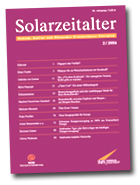 Since 1989, the quarterly published magazine "Solarzeitalter - Politik und Ökonomie Erneuerbarer Energien" ("The Solar Age - Politics and Economy of Renewable Energy") is the official German-speaking organ of EUROSOLAR, the European Association for Renewable Energy, and of the World Council for Renewable Energy (WCRE), based in Bonn/Germany at the EUROSOLAR international office. The "Solarzeitalter" magazine is edited by Hermann Scheer, President of EUROSOLAR and General Chairman of the WCRE.
Since 1989, the quarterly published magazine "Solarzeitalter - Politik und Ökonomie Erneuerbarer Energien" ("The Solar Age - Politics and Economy of Renewable Energy") is the official German-speaking organ of EUROSOLAR, the European Association for Renewable Energy, and of the World Council for Renewable Energy (WCRE), based in Bonn/Germany at the EUROSOLAR international office. The "Solarzeitalter" magazine is edited by Hermann Scheer, President of EUROSOLAR and General Chairman of the WCRE.
Starting from 2006, the "Solarzeitalter" magazine is launched in a new size (170 x 240 mm), each hardback copy comprising 120 pages.
The "Solarzeitalter" magazine does not cover technical questions or projects but discusses political and economic programmes and concepts for renewable energies. It reflects their evolution and gives a space for controversial debates related to them.
Authors writing for the "Solarzeitalter" magazine are internationally accepted and well-known experts of their field. The "Solarzeitalter" magazine influences the formation of opinion on renewable energy in politics and media.
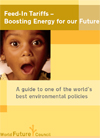 World Future Council brochure, June, 2007
World Future Council brochure, June, 2007 A guide to one of the world's best environmental policies
Climate Change “is the greatest market failure the world has seen”. This analysis from Nicholas Stern has stimulated decision makers in many countries to consider new approaches to energy policy. Energy is the most important factor in human development, but our present dependence on fossil fuels is in danger of causing untold harm to future generations. Renewable energy (RE) is the best overall solution to climate, energy and economic security.
![]() Article by Hermann Scheer, published in the German edition of "Le Monde Diplomatique", February 2010
Article by Hermann Scheer, published in the German edition of "Le Monde Diplomatique", February 2010
The main reason why the public around the world were so shocked by the shameful outcome of the World Climate Conference in Copenhagen was that they were basically unprepared for failure. Everything seemed to be pointing to success: a manifestly pressing problem, upbeat government announcements, urgent appeals from NGOs, worldwide media interest and the participation of numerous heads of state, who hoped to turn the meeting into a "G120" summit.
But the debacle was really not so surprising. It was not by chance that the World Climate Conference used the same script as the 14 previous events staged since 1995: dramatic "now or never" appeals in the run-up to the conference, a process of small-minded and paralysing haggling producing pitiable results and a decision in favour of a follow-up conference during the event, and in the aftermath, mutual finger-pointing. One exception – albeit only in relative terms – was the Kyoto Protocol of 1997, but even in this case it took a further six climate conferences before it came into force in 2005. Even this agreement, however, was unable to prevent a further increase in greenhouse gas emissions.
 Hermann Scheer, published by earthscan from Routledge, The Energy Imperative: 100 Percent Renewable Now.
Hermann Scheer, published by earthscan from Routledge, The Energy Imperative: 100 Percent Renewable Now.
The English translation of Der energethische Imperativ was released in December 2011.
ISBN-13: 978-1849714334
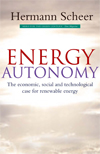 Published in December 2006, Earthscan/James & James, 300 pages, ISBN 1-84407-355-6
Published in December 2006, Earthscan/James & James, 300 pages, ISBN 1-84407-355-6
The Economic, Social and Technological Case for Renewable Energy
For 200 years industrial civilization has relied on the combustion of abundant and cheap carbon fuels. But continued reliance has had perilous consequences. On the one hand there is the insecurity of relying on the world’s most unstable region – the Middle East – compounded by the imminence of peak oil, growing scarcity and mounting prices. On the other, the potentially cataclysmic consequences of continuing to burn fossil fuels, as the evidence of accelerating climate change shows.
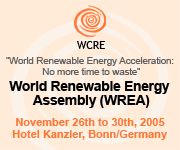 WCRE paper, November 30th, 2005
WCRE paper, November 30th, 2005
World Renewable Energy Assembly (WREA) 2005, Bonn/Germany, Final Communiqué
The Human Right to Renewable Energy
“All human beings are born free and equal in dignity and rights.“ This first sentence of the Universal Declaration of Human Rights articulates a basic human commitment. Only by respecting this commitment, a humane life in peace can be assured durably. Energy is the fundamental prerequisite of every life. Availability of energy is a fundamental and indivisible human right.
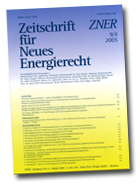 Since 1997, Hermann Scheer is editing the German-language ZNER magazine. The quarterly ZNER magazine ("Zeitschrift für Neues Energierecht", "Magazine for New Energy Law") is the only German jurisprudential periodical focussed on juridical conflicts around renewable energy.
Since 1997, Hermann Scheer is editing the German-language ZNER magazine. The quarterly ZNER magazine ("Zeitschrift für Neues Energierecht", "Magazine for New Energy Law") is the only German jurisprudential periodical focussed on juridical conflicts around renewable energy. The ZNER magazine contains articles, documentations and comments of the current legal practice and legislation.


 The "Solarzeitalter" magazine media data (pdf)
The "Solarzeitalter" magazine media data (pdf)